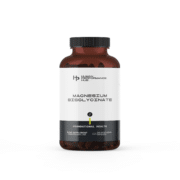Research has shown that almost 50% of people have a magnesium deficiency, yet it is vital for more than 300 enzymatic reactions in the body. Plus, a magnesium deficiency can cause a number of health issues, including heart, kidney and bone health. In this article we explain some of the top magnesium bisglycinate benefits and how to properly supplement with magnesium.
So, what are magnesium bisglycinate benefits? The benefits of taking magnesium supplements include:
- Maintaining bone health
- Aiding digestion
- Promoting cardiovascular health
- Enhancing sleep and relaxation
- Relieving chronic headaches
- Supporting women’s health
Read on to learn more about magnesium bisglycinate and how supplements can benefit your health. We also advise on dosage and how to take magnesium supplements for maximum results.
What are Magnesium Bisglycinate Benefits?
Magnesium bisglycinate has been shown to have a variety of health benefits, including:
Maintains Bone Health
Magnesium partners with calcium in maintaining bone health. Many individuals supplement calcium without adequate magnesium, leading to ineffective support for bone health. Magnesium is also needed for the proper activity of vitamin D which is crucial for bone health.
Aids Digestion and Elimination
Individuals with low stomach acid or less-than-optimal digestion often lack adequate magnesium since absorption is compromised. Magnesium chelates help restore a healthy magnesium balance when digestion is inefficient and promotes a healthy elimination pattern.
Promotes Cardiovascular Health
Magnesium helps support muscle relaxation and function, which is vital to cardiovascular health since the heart is a muscular organ. Magnesium is also an essential cofactor in several enzymes that support healthy blood pressure.
Enhances Relaxation and Sleep
As magnesium helps muscles relax, it can enhance general relaxation, promote a sense of calm, and support normal sleep patterns.
Helps Metabolise Carbohydrates
Magnesium is critical for the biochemical reactions involved in converting carbohydrates and fats into energy. It may also contribute to the proper functioning of insulin receptors.
Supports Kidney Health
As magnesium balances calcium, it may support kidney health by reducing the risk of abnormal deposits in the kidneys.
Relieves Chronic Headaches
Magnesium supplementation has long been known to reduce the frequency and severity of migraines and milder forms of headaches. Since as many as half of all migraine sufferers may be magnesium-deficient, researchers note that “oral magnesium is warranted in all migraine sufferers.”
Regarding migraine prophylaxis, adequate quantities of magnesium is critical for maintaining the electrolyte balance that contributes to the proper polarisation of neuronal membranes. Overlapping pathophysiologic mechanisms were noted between migraine and epilepsy; abnormalities in neuronal polarisation and excitability may contribute to migraine, as they are known in seizure disorders.
Contributes to Women’s Health
Magnesium deficiency contributes to numerous health issues in women, such as dysmenorrhea, premenstrual syndrome, menstrual migraine, and post-menopausal symptoms. Research determined that supplemental magnesium helps prevent or relieve symptoms in these cases and may also positively impact eclampsia, pre-eclampsia and leg cramps during pregnancy.
What is Magnesium Bisglycinate?
Magnesium is an essential mineral that assists in over 300 biochemical reactions in the body. It is crucial for energy production, bone and muscle health, physical strength and mobility, neurological health, and metabolism.
As the second most abundant mineral inside cells, magnesium helps convert food (especially carbohydrates) to energy. Over 60% of the body’s magnesium is stored in the skeleton; the remaining portion is primarily housed in your muscles.
Magnesium bisglycinate is made when two separate glycine molecules occupy an active site on each magnesium molecule, leading to superior absorption because of increased solubility – this makes magnesium supplements easy to consume.
Sources of Magnesium
The primary sources of magnesium are food and supplements. Research suggests that ocean seawater also contains high levels of magnesium, perhaps more than food. In this case, the body would absorb magnesium through the skin whilst, for example, swimming. This is particularly beneficial as some people have difficulties breaking down and absorbing magnesium-rich foods in the gut and intestine.
The highest magnesium-rich foods include:
- Dark leafy greens
- Seeds and nuts
- Beans, fish
- Whole grains
- Avocado
- Bananas.
While you can get magnesium from food sources, most people do not get enough; minerals are not stored in the body, therefore, it’s incredibly important to consume an adequate amount every day, which is why including a magnesium supplement in your diet is vital to boost and maintain optimal levels of this essential mineral.
How Much Magnesium Bisglycinate Should I Take?
We recommend that magnesium bisglycinate be taken between your evening meal and going to bed. However, unlike many other supplements, it can be taken on an empty stomach if necessary.
The recommended daily intake for men and women is:
- Women – 2 capsules per day (~300mg)
- Men – 4 capsules per day (~600mg)
Human Performance Hub’s Magnesium Bisglycinate contains highly absorbable magnesium, with each capsule providing 150 mg of elemental magnesium. This product should not cause any unfavourable gastrointestinal symptoms associated with magnesium supplementation due to the very stable chelate formed between two glycine molecules and each magnesium ion via a patented process.
Consultations
We’re always here to help. If you have any questions or would like advice on nutrition, supplements or training, please book in for a consultation.


